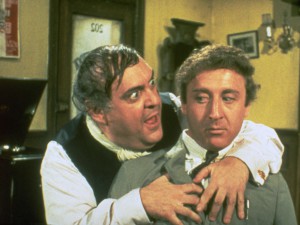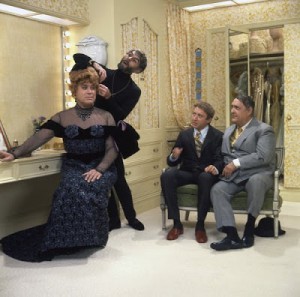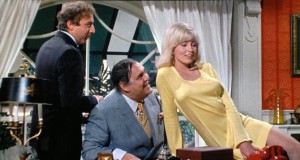Written for Il Cinema Ritrovato’s catalogue in June 2018. — J.R.
“My movies rise below vulgarity,” Mel Brooks once allegedly declared. No movie of his better illustrates that proposition than his first and most successful feature (1967), which won him an Oscar for best original screenplay and, over three decades later, was remade first as a Broadway musical (by Brooks himself) and then as a movie (directed by Susan Stroman) based on that production. Yet it was originally deemed unreleasable due to its bad taste by Embassy Pictures, then given an inauspicious premiere in Pittsburgh. It won a second life only after Peter Sellers — who’d originally been cast in the leading role of Max Bialystock (before apparently chickening out) — saw the film privately and bought an ad in Variety arguing for a wider release.
The eponymous heroes, Bialystock (Zero Mostel) and Leo Bloom (Gene Wilder) — a bombastic gigolo who gets old ladies to invest in his failed Broadway shows and a hysterical, mousy accountant, respectively — decide to rise below vulgarity themselves in order to make a bundle by producing a costly, sure-fire flop, a show so awful and offensive that it can only fail, so they can thereby pocket the surplus on all the investments, only to discover that Springtime for Hitler winds up as a satirical hit. Ironically, the appeal of bad-taste jokes about Hitler has been so triumphant ever since that what’s likely to offend people more today are the sexist and homophobic stereotypes (whereas the flower-power satire already seemed off the mark even in 1967).
Arguably the most Jewish of American comic writer-directors in his cheerful embrace of callow excess in terms of both style and content, even making room for references to James Joyce and Franz Kafka amidst all the lowbrow mugging and earthy slapstick, Mel Brooks sets the template here for both overripe performances and lavishly overproduced musical numbers devoted to atrocities in many of his subsequent features. And in the final analysis, what may seem most charming about his primitive professionalism is what’s most unprofessional about it. — JONATHAN ROSENBAUM




